January 2017 is Cervical Health Awareness Month
By SCMA On 16/01/2017


January 2017 is Cervical Health Awareness Month, and Specialty Certified Medical Assistant – SCMA® wants you to know that there's a lot you can do to prevent cervical cancer.

HPV (human papillomavirus) is a very common infection that spreads through sexual activity. About 79 million Americans currently- about one in four - have HPV OR, but many people with HPV don't know they are infected.
HPV is also a major cause of cervical cancer. The virus can also cause:
- cancers of vagina and vulva in women
- cancers of the penis in men; and
- cancers of the anus and back of the throat, including the base of the tongue and tonsils (oropharynx), in both women and men.
Each year, more than 11,000 women in the United States get cervical cancer.
The good news to share with your patients?
- The HPV vaccine (shot) can prevent HPV.
- Cervical cancer can often be prevented with regular screening tests (called Pap tests) and follow-up care.
In honor of National Cervical Health Awareness Month, SCMA® encourages you to share these:
- Women to start getting regular Pap tests at age 21
- Parents to make sure pre-teens get the HPV vaccine at age 11 or 12
- Teens and young adults also need to get the HPV vaccine if they didn't get it as pre-teens. Women up to age 26 and men up to age 21 can still get the vaccine.
How can Cervical Health Awareness Month make a difference?
We can use this opportunity to spread the word about important steps women can take to stay healthy.
Here are just a few ideas:
- Encourage your patients to get their well-woman visit this year.
- Let your patients know that most insurance plans must cover well-woman visits and cervical cancer screening. This means that, depending on their insurance, women can get these services at no cost to them.
- Talk to parents about how important it is for their pre-teens to get the HPV vaccine. Both boys and girls need the vaccine.
Thanks to the health care reform law, you and your family members may be able to get these services at no cost to you. Check with your insurance company to learn more.
Taking small steps can help keep you safe and healthy.
More Information
- The National Cervical Cancer Coalition
Cervical Health Awareness Month Sponsor - Human Papillomavirus (HPV)
Centers for Disease Control and Prevention - Genital HPV Infection Fact Sheet
Centers for Disease Control and Prevention - Cervical Cancer Prevention
National Cancer Institute - Cervical Cancer Fact Sheet
Office on Women's Health - HPV Fact Sheet
Office on Women's Health - Pap Test Fact Sheet
Office on Women's Health - HPV and Cervical Cancer
National Cervical Cancer Coalition - HPV Vaccine Fact Sheet
U.S. Department of Health and Human Services
 844.885.1476
844.885.1476
